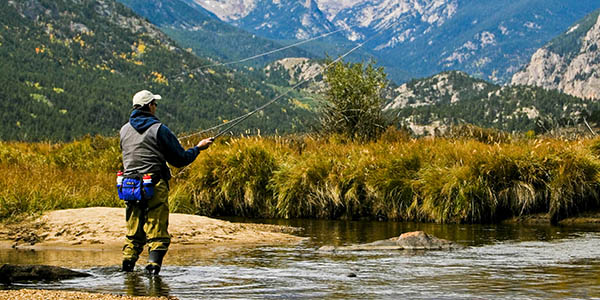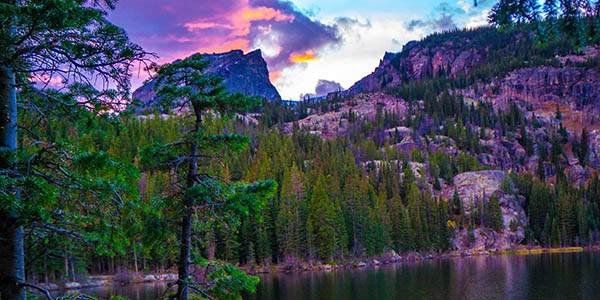Rocky Mountain National Park
Situated in the Front Range of the Colorado Rockies, Rocky Mountain National Park is the fifth most visited national park in the United States, with over 3 million visitors every year. This gorgeous wilderness park features a wide variety of landscapes and wildlife, plus ample opportunities for scenic drives and hikes as well as other outdoorsy activities, particularly during the summer months.
Colorado’s Crown Jewel
This sprawling national park spans well over 265,000 acres of land in the heart of the Rocky Mountains. The park sits between Grand Lake and Estes Park, about an 80-mile drive northwest of Denver. Geography here is varied: the park is divided in to five regions, with meadows, alpine, waterfall-dominant, and wilderness areas as well as a central area with a variety of high-elevation lakes and tundra-dominated landscapes. The Continental Divide, which separates the Pacific-draining and Atlantic-draining river systems of North America, runs right through the park, and each side of the park has its own unique look and feel. The park is also home to the scenic Trail Ridge Road, the highest continuous paved road in the United States.
Sporting, Fishing and More
While this mountainous park is hugely popular in the winter months, with lots of opportunities for snowshoeing and cross-country skiing, most visitors come during the summer. Popular warm-weather activities include camping, hiking, horseback riding and rock climbing. Road cyclists appreciate the numerous park roads, and the Trail Ridge Road from Estes Park to Grand Lake provides a challenging trip for hardy cyclists. Though the park has a huge selection of lodges and campsites, back-country backpacking and wilderness camping are also hugely popular here. Fishing is also a draw for many visitors, though it’s a good idea to check with park rangers ahead of time as some of the waters are not open to fishing and others only allow catch and release.

Placing the perfect cast near Rocky Mountain National Park
Indian Histories
The area now known as Rocky Mountain National Park has been inhabited by humans since the Paleo Indian times. For centuries, it was home to Native people until the 1820 Long Expedition brought European settlers to the area. Things really started to change here in the latter half of the 19th century, when Native people were moved to reservations and gold and silver prospectors came to the area. But the mining tradition didn’t last long here, and by 1915 the region was established as a national park. Many of the lodges found around the park were developed soon after and by the 1950s a ski park opened here, just west of Estes Park. Today, it’s a popular summer destination, with great camping and ample outdoor activities.
Artistic Splendor
The Rocky Mountain National Park offers its own artist in residence program, giving artists the opportunity to spend two weeks in the William Allen White cabin, creating art and giving public presentations. The area is also full of art galleries showcasing everything from nature photography to glass art, particularly in the nearby town of Estes Park. Taking a scenic drive is another way to experience the beauty of the park. Trail Ridge Road is the most famous, celebrated for being the highest paved road in the U.S., with 48 miles of stunning highway, 11 of which are above the tree line. Old Fall River Road is a popular alternative, with 11 miles of winding gravel road that connects Horseshoe Park to Fall River Pass.
Party in the Rockies
Most of the events in the park center around its five visitor centers. Beaver Meadows offers a gift shop and screenings of a 20-minute film on the park, while the Alpine Visitor Center, situated at 11,796 feet, offers educational programs about the alpine tundra climate. Moraine Park Discovery Center features a bookshop and interactive exhibits, while the Kawuneeche Visitor Center features a wide range of ranger-led talks and activities, particularly during the high season. The seasonal Fall River Visitor Center showcases wildlife survival exhibits and hosts regular ranger-led programs. Those with an interest in astronomy should aim to plan their visits for the summer months, when local educational programs led by rangers and local astronomers take place.
Holzwarth Historic Site
Located about 74 miles north of the Grand Lake Entrance of the park, the Holzwarth Historic Site, also known as the Never Summer Ranch, provides a glimpse into life in the area about a century ago. This well-preserved property originated in 1917 as a homestead, later morphing into an old-school dude ranch, complete with cabin lodging and a barn. Today it operates as a historic site, with tours available from the middle of June through Labor Day.
Peak Experiences
Rocky Mountain National Park is dominated by Longs Peak, the iconic 14,259-foot mountain named after Maj. Stephen H. Long, who guided an expedition that traversed the Great Plains and the base of the Rockies in 1820. Visible for miles around, the explorers were transfixed by the northern range’s highest mountain, yet they never entered the land that would become Rocky Mountain National Park. Some 48 years later, it’s widely stated that John Wesley Powell led the first party to climb Longs Peak. Whether it’s the mountain’s thrilling vital statistics, its nerve-tingling reputation or its significance in the annals of Colorado climbing history, Longs Peak remains a source of fascination for intrepid hikers who are looking to test their grit in the mountains.

The setting sun castes amazing colors over Bear Lake in Rocky Mountain National Park
For More Information
Rocky Mountain National Park
970-586-1206
www.nps.gov/romo
Colorado Tourism Office
800-265-6723
www.colorado.com






